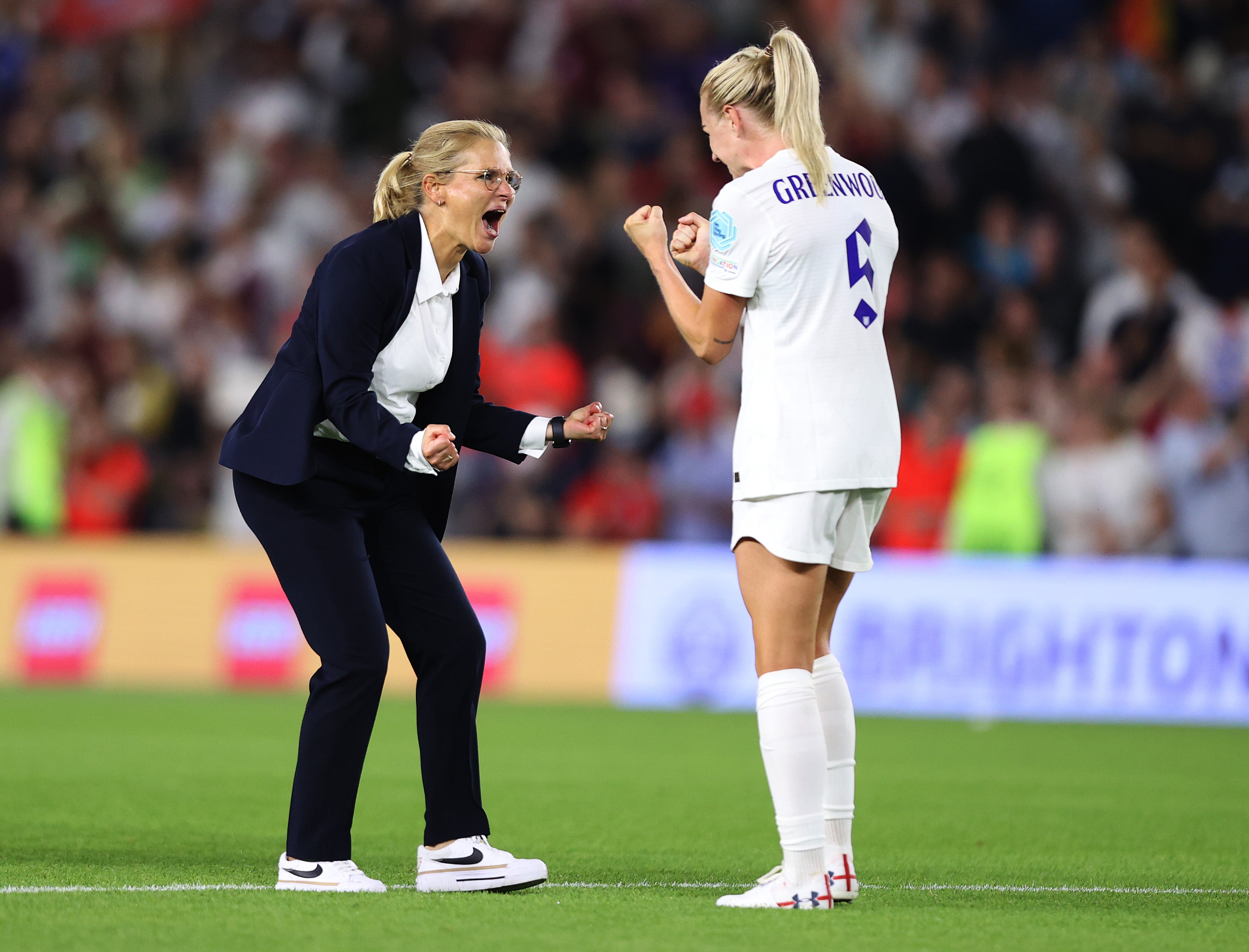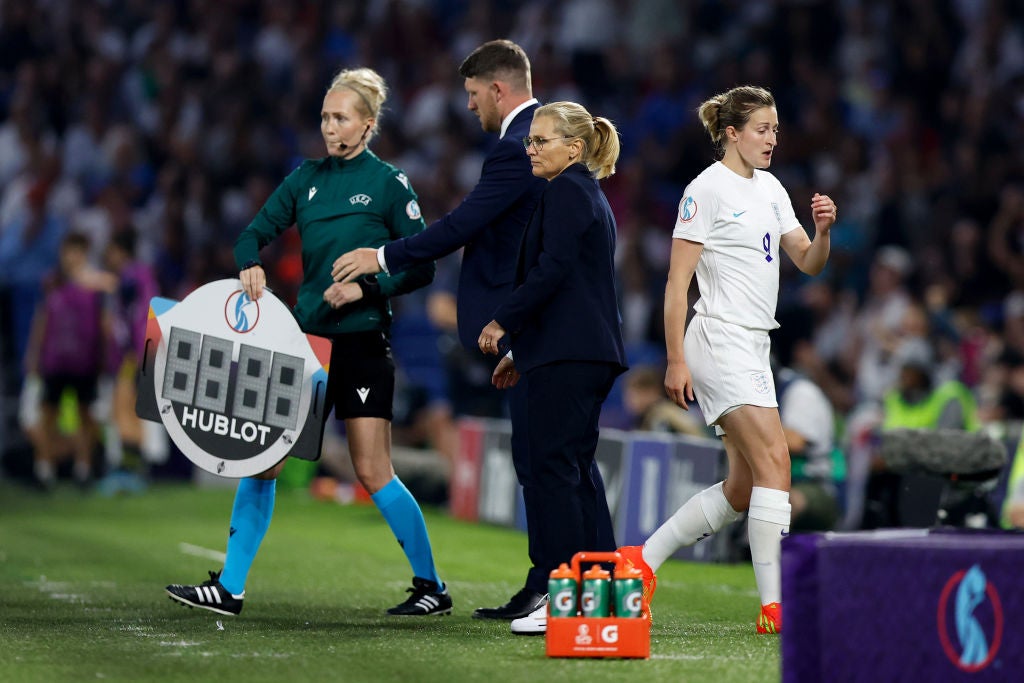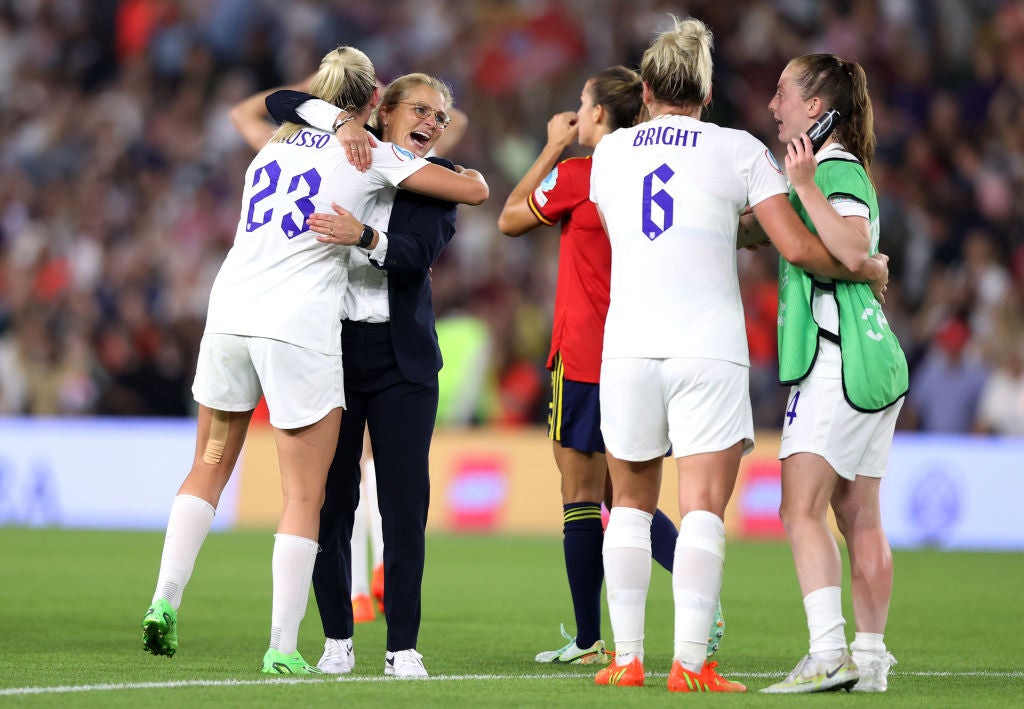Sarina Wiegman proves her class to guide England from the brink
England 2-1 Spain (after extra time): With the Lionesses staring at elimination, Wiegman made a series of bold substitutions that would turn the match around

Your support helps us to tell the story
From reproductive rights to climate change to Big Tech, The Independent is on the ground when the story is developing. Whether it's investigating the financials of Elon Musk's pro-Trump PAC or producing our latest documentary, 'The A Word', which shines a light on the American women fighting for reproductive rights, we know how important it is to parse out the facts from the messaging.
At such a critical moment in US history, we need reporters on the ground. Your donation allows us to keep sending journalists to speak to both sides of the story.
The Independent is trusted by Americans across the entire political spectrum. And unlike many other quality news outlets, we choose not to lock Americans out of our reporting and analysis with paywalls. We believe quality journalism should be available to everyone, paid for by those who can afford it.
Your support makes all the difference.Six minutes plus stoppage time. That is how close England were to the precipice, how close they came to throwing away a chance to win their first major international tournament and win it on home soil. Indeed, at times at the Amex, particularly during a one-sided first half, they could not have looked much further away from the standards set by their quarter-final opponents. Spain had done little to live up to their pre-tournament hype until then. Suddenly, the Lionesses were not fulfilling the favourites tag their performances in the group stage had earned.
And yet, it is in those moments, as the clock ticks down and something needs to change, that the presence of a best-in-class coach can make all the difference. England’s greatest asset at Euro 2022 is not Georgia Stanway, despite her spectacular winning goal struck from 25 yards out that booked a place in the semi-finals. It is not Ella Toone, the diminutive super-sub who equalised and is arguably deserving a proper run in the starting line-up. It is, instead, the manager picking that line-up and - more importantly - fixing it when required.
Sarina Wiegman plans for every eventuality. Just ask her assistants, who took charge while she was struck down with Covid-19 last week and in the build-up to this quarter-final. Were it not for the good fortune of a negative test result, confirmed only a few hours before kick-off, she would have watched from England’s Teddington training base, imparting instructions down a telephone line, but not seeing and analysing proceedings in quite the same manner. Perhaps, then she would not have made the same, bold decisions that turned this tie in England’s favour.
For there were bold decisions, particularly in the moments immediately after Esther Gonzalez’s breakthrough at the start of the second half handed Spain a lead that was deserved. Off came Beth Mead, still the leading scorer at this tournament, despite England’s need for an equaliser. Ellen White was also sacrificed, no sympathy for the Lionesses’ all-time leading goalscorer. Fran Kirby, the source of so much of this side’s imagination, followed them both to the bench shortly after. England’s approach had to change drastically, too, and did.

Throughout the faultless group stage campaign, Wiegman spoke time and time again about the importance of rhythm. All of England’s unchanged line-ups up to this point were to preserve the impetus generated not just during these Euros so far but since the start of her unbeaten run in charge. Ideally, they would be able to keep the same patterns of play, the same rotations and repetitions, and the same unrelenting momentum of a runaway freight train all the way to Wembley.
Except if there is any side at this tournament who can bend the tracks beneath that runaway train, throw leaves down on the line or do whatever to slow it to a halt, it was their quarter-final opponents.
Keeping the ball is the abiding principle of Spain’s play, perhaps the only one that is non-negotiable. Jorge Vilda’s side play as though possession in ten tenths of the law, as though they have a divine right to it. And despite an underwhelming start to Euro 2022 by one of the pre-tournament favourites, despite never before winning a knockout game at a major tournament, they - not England - were always likely to be this game’s protagonists.
Wiegman accepted as much. “It’s okay sometimes to not have the ball,” she reiterated before kick-off, having preached the same in her pre-match press conference. That was the sensible, pragmatic and correct approach, but it was also quite a departure for an England side that had enjoyed the vast majority of the play in their three group games. They would not enjoy the same level of control and authority as they otherwise have over the past few weeks. Something different would be required.

The idea was to fight Spain’s patient use of the ball with patience - to hold shape, to wait for the right moment, and only then to pounce and press, hitting them hard on the counter-attack when the ball was won back. It was a sound plan, but it was a shift from what had come before, and that unsettled Wiegman’s players. Whether it was Rachel Daly stepping up too soon at times, the rushed and over-hit passes out from the back, or the ominous sight of the midfield slowly becoming overrun, it was clear that this new approach was not quite working.
Once Spain went ahead, thanks in no small part to the electric wing play of Athenea del Castillo, Wiegman reverted to the more proactive, front-foot methods her players are more familiar with. She had to. England had to. They had to chase the game. But the courage of replacing Mead, White and Kirby to instead count on Toone’s off-ball movement, Chloe Kelly’s menacing dribbling and Alessia Russo’s running in behind should not go unnoticed. It was the type of brave call that England managers - both men’s and women’s - have hesitated to make in the past. The type that could backfire.
But instead, England rebuilt and rediscovered that momentum that Spain had successfully slowed. Toone’s goal - volleyed in at close range, after a Russo knockdown from a Lauren Hemp cross - was the catalyst, but there was a new purpose in the play which led directly to it, a haste that England had previously lacked. From there on, the wind was at their backs again. There was wave after wave of attack, all the way up to Stanway’s winner. Showing respect to Spain’s possession game was the right call on paper but perhaps not in practice. Wiegman, to her immense credit, realised as much and reverted to the thrilling forward momentum that has now carried England to the semi-finals.
Join our commenting forum
Join thought-provoking conversations, follow other Independent readers and see their replies
Comments